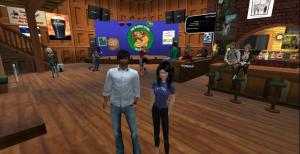My first interview in the Dublin community was fairly successful! At first it was difficult to find people, but using the mini map helped. People were very willing to talk, some even tried to say hi to everyone as they came into the location we were at.
The person that I interviewed was very willing to answer my questions, and also willing to share information about Second Life in general. I do think that interacting in some of the same things as the other users in the location help to connect with them so that they are more willing to answer questions.
Here is a look at part of my interview:
[14:35] BethJoy2: Hi, I’m from the USA and I am using Second Life in a final project for a class. Would you mind if I ask you a few questions?
[14:36] DellLacombe: Sure, go ahead!
[14:36] BethJoy2: Thank you!
[14:37] BethJoy2: When you first meet a stranger in Second Life do you normally stand close to them or farther away?
[14:37] DellLacombe: Close
[14:38] BethJoy2: Does that change depending on their gender, age, race, or social class?
[14:39] DellLacombe: No, because when I meet a new person in SL I understand that I know nothing about their real life gender, age, race, or social class.
[14:48] BethJoy2: Is there a limit you place on how personal your conversation becomes? What would be a “polite” conversation to keep in place? Does this change based on if you know the real gender, age, or race of the person?
[14:52] DellLacombe: My limits on conversation in SL mimic my limits in RL. It depends on how well I know the person, and how comfortable they are in talking about different things. I have some friends in SL I can talk about absolutely anything with; other are more uptight. One thing about SL though is that it seems to compress the time it takes for you to feel like you know someone; where in RL it might take a couple of months to consider someone a ‘friend’ that might only take 3-4 weeks in SL.
[14:54] DellLacombe: And knowing the RL information doesn’t change things.
[14:54] BethJoy2: That’s very interesting. So if someone expresses a belief you find to be odd does it offend you or make you more curious? Do you ask them to explain them self?
[14:55] DellLacombe: It makes me curious and I’ll often ask for an explanation; though I am kinda quiet and unless I was really curious I might just let it go.
[14:56] BethJoy2: I can relate to that. Can you give me an example of a belief that you find offensive?
[14:59] DellLacombe: I feel that beliefs are neutral. We all have our own beliefs just like we have our own opinions and our own favorite colors. A person’s beliefs are not really anything that can be judged because they are what they are; just like their favorite color. Somone may say that they like Yellow, and I don’t like that color, but I don’t think less of that person for liking that color.

